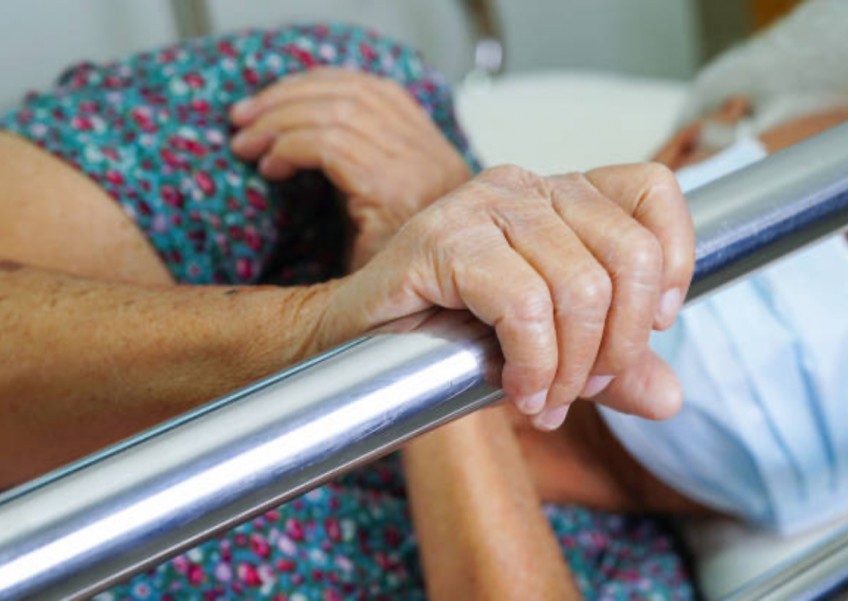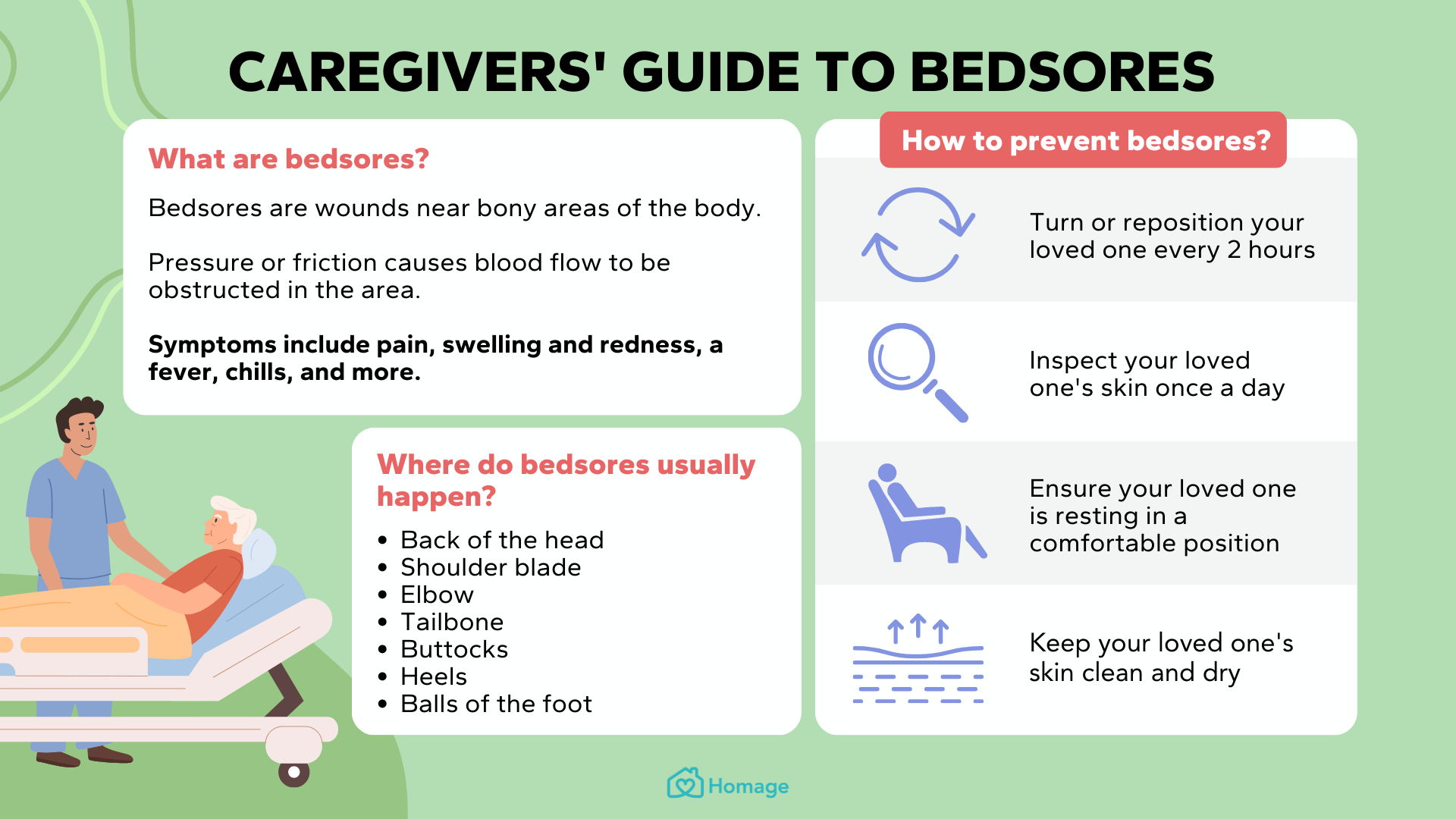Caring for a bedridden loved one? Here's what to expect

Jing works in PR and always keeps an eye out for unique narratives that could make for a good story. She's a fan of human interest stories and learning what makes people tick. With cross-industry experience, she's written on an array of topics including healthcare, sustainable supply chains, agribusiness and renewable energy. A serial hobbyist, you could find her at the beach, yoga, tending to her plants or watching some good old TV.
Whether you're caring for an ageing parent, a family member or a spouse, it requires an enormous commitment of time and energy. In some cases, if your loved one is suffering from the aftermath of a stroke, or a cancer diagnosis, or has become frail with age, they may become temporarily or permanently bedridden.
With their limited mobility and loss of independence to carry out activities of daily living (ADLs), they will likely require more assistance with everyday activities which can add to the stress of your caregiving responsibilities.
Additionally, due to the lack of activity for extended periods of time, being bedridden can lead to complications such as bedsores, respiratory issues and depression. Dealing with these issues can seem daunting, and it is important to know what to expect when caring for a bedridden individual and have access to the right resources and support networks.
When a loved one becomes bedridden, beyond it being a big physical adjustment, it can also be emotionally challenging for both themselves and you.
As your loved one's ability to care for themselves declines, they will likely experience a range of emotions, which they may or may not be able to articulate. To name a few, they may experience helplessness, distress and anger.
You may similarly feel overwhelmed as you witness their struggle with this new situation. With these added responsibilities, remember to take things one day at a time, and do your best to practise acceptance, patience and empathy.
While it is natural to resist change and loss, learning to live through the situation allows you to take control, instead of letting it take control over you. The act of acceptance can bring about unexpected relief. It includes accepting the situation, accepting help, accepting loss and accepting the emotions — both good and bad that come with this transition. Lean into the situation and see what it can teach you, instead of trying to avoid or sweep it under the rug.

In your new role, it is important to put yourself in their shoes and understand their condition so that you are equipped to understand what will be required of you.
If your loved one is about to be discharged from the hospital, speak to their doctor and nurses to understand their care plan. For example, what medication do they need? Are there any exercises you can do with them, or do they need to go for physiotherapy? Will their condition change, and if so, what should you keep an eye out for?
These are some questions to start, but gather as much information as possible and learn what tasks are required of you so that you can best care for them. Whether or not you are the primary caregiver, it is still important to know your loved one's schedule and medical appointments so that you can plan ahead. Post-discharge, continue to keep track of their condition and consult their doctor when anything new or unfamiliar arises.
Becoming bedridden is a jarring change and many often feel like they have little to no control over their own body which can be detrimental to their mental and emotional health. Helping them maintain their autonomy as much as possible by involving them in the decision-making process can help with this.
As their caregiver, it may be easy to assume you know what is best, but it is still necessary to respect your loved one's choices and empower them to have control over their life. For example, ask them about their treatment plan — is there anything they want to change? Would they rather take a different approach?
Your loved one knows themselves best, so while you have the best of intentions, take a step back where possible and make sure they are involved in decisions around their health.
It is also helpful to articulate to your loved one's that you are there to support them. While it will be a learning journey for all, such words can be reassuring and help you start off on the right foot.

The world is a vast place, but for the bedridden, it can seem lonely. Loneliness has been a growing public health challenge in Singapore, and is not limited to those who live alone. Recent studies have shown that loneliness is a major concern for older adults, and similar to smoking and cardiovascular disease, it affects mortality rates.
For those who are bedridden, they are often confined to their rooms and the reduced social contact can lead to loneliness and snowball into other conditions like depression and dementia. When you check in on your loved one, beyond ensuring their physical needs are met, it is key to check in on their emotional needs which often go unseen.
If they cannot be physically active, occupying their mind in ways that are fun can distract them from their situation. There are many activities you can do to keep them engaged with the world beyond their four walls.
The simplest way to keep them engaged is to strike up a conversation. You could look through family photos and reminisce about childhood memories and funny stories, or just share how your day has been going. Nothing beats a good conversation!
Beyond understanding your loved one's condition and keeping them engaged, there are other factors you should take into account to make them as comfortable as possible.

Bedsores are common for individuals who are bedridden or immobile. They are caused by prolonged periods of lying or sitting down and the pressure exerted on the skin can lead to tissue damage. If not treated properly, they can lead to infections and in severe cases, osteomyelitis (bone infection).
Here are a few ways to prevent bed sores from occurring:
Feeling clean and fresh is the first step to feeling good about yourself. As maintaining personal hygiene for individuals who are bedridden might be challenging, ask for help when you need it. Depending on their mobility level, they may be able to take a warm shower or bath with minimal assistance. If not, a bed bath by wiping them with wet towels or sponges can act as a great substitute for a shower. This is also a good opportunity to spot any sores or body changes.
Other areas of personal grooming include dental care, nail care and keeping their hair trimmed and tidy. Remember to help them change into fresh, clean clothes on a daily basis as well. These can go a long way in helping them stay confident, presentable and boost their self-esteem. Here are more ways you can cater to your loved one's hygiene needs.

Bedridden individuals may have dietary restrictions based on their condition, so make sure to check in with their doctor if there is anything to take note of. For instance, cancer patients are often recommended to consume immunity boosting foods while a post-surgery diet may consist of softer foods that are easier to digest.
Your loved one may also have lower caloric needs due to the lack of physical activity, so it is important to adjust accordingly. Do consult a dietician if necessary!
Good eating habits are instrumental in ensuring physical health, so here are some meal plan tips:
ALSO READ: The circle of life: A daughter's caregiving story